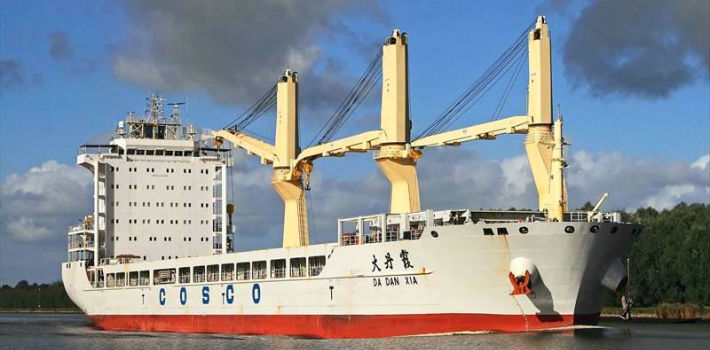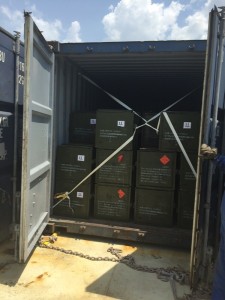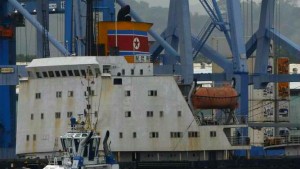
EspañolOn Sunday, March 8, a Colombian judge ordered the arrest of Wu Hong, the captain of a Hong Kong registered freighter intercepted on the way to Cuba carrying an unregistered cargo of high-caliber ammunition.
Captain Wu, who faces arms trafficking charges, will remain under house arrest in Cartagena while the investigation is underway.
Colombian authorities impounded the ship at Mamonal Port in Cartagena on March 4, discovering within eight shipping containers some 100 tons of gunpowder, 2.64 million rounds of centerfire ammunition, 99 missile heads, and almost 3,000 cannon shells.
After 48 hours of inspections in the Caribbean city, the police proceeded to request the detention of Wu. Under Colombia’s Criminal and Commerce Laws, restricted firearms cannot be transported on commercial ships.
The Prosecutor’s Office claims the captain put the population of Cartagena at risk, as the boat was docked in Mamonal’s industrial zone near the city’s refinery and factories employing volatile chemicals.
Guns, Not Grain

As soon as the Chinese government found out about the ship’s seizure, its Foreign Ministry claimed that it was involved in “normal trade cooperation.”
A spokeswoman for the Chinese ministry, Hua Chunying, said the Hong Kong-based ship’s transportation of “normal military supplies” to Cuba was part of a legal arms exports deal with the island and did not violate any of China’s international obligations.
Colombian Attorney General Luis González responded that the documentation provided by the crew regarding the merchandise made no mention of ammo, instead only detailing a cargo of grain.
Photographs released by the police reveal that the undisclosed cargo’s provider is Norinco, a Chinese firm that produces weapons and military equipment for the Asian nation’s army. The destination appears as Tecnoimport, a Havana-based company that imports technical supplies with ties to the Cuban military.
Complicating Removal from Terrorist Black-List
One day prior to the seizure of the Da Dan Xia, the presidents of Spain and Colombia gave a joint press conference in Madrid, where Colombian President Juan Manuel Santos stated that the United States is likely to remove Cuba from its list of states that sponsor terrorism. The Colombian head of state said talks are moving “in the right direction.”
Santos heralded US President Barack Obama’s decision to restore diplomatic ties with Cuba, and said it was the first “big step” toward removing the island from the list.
On February 26, the US House Foreign Affairs Subcommittee on the Western Hemisphere conducted the public hearing “The President’s New Cuba Policy and US National Security” to discuss whether Cuba should be removed from the State Department’s terrorism list.
Those opposing the action testified about Cuba’s past and present activities directed against the United States, including the sending of Cuban officials to Vietnam during the war. Legislators also highlighted the offering of political asylum to members of terrorist organizations such as ETA and FARC, fugitives accused of million-dollar fraud by the US justice system, and alleged “domestic terrorists” such as Joanne Chesimard, on the FBI most-wanted list.
Others expounded on Cuba’s dispatch of military, police, and intelligence advisors to Venezuela in order to help monitor and repress dissidents; on the Cuban regime’s talks with Russia to reopen the Lourdes telecom signals spy base, and the welcoming of Russian spy ships to Cuban ports.
Witnesses similarly presented the case of 173 Venezuelan passports issued to Islamist radicals for them to enter Canada; the selling of US state secrets to the governments of Iran, Syria, and Russia; and the recruitment and infiltration of spies among the top ranks of the US government.
Caught Red-Handed, Again

In mid-2013, a similar case surfaced when Panamanian authorities impounded a North Korean ship carrying undeclared Cuban weapons amid a cargo of sugar.
A 2014 UN report concluded that the transaction violated international restrictions designed to curb North Korea’s nuclear missiles program.
The Cuban Foreign Ministry claimed to be sending the armaments to North Korea for repairs, but UN experts cited evidence that some weapons had been recently evaluated and certificated, or were even unused in their original packaging.
Cuba’s regime insisted the shipment was part of a legal deal between the two nations but refused to turn in copies of the agreement, citing confidentiality clauses.
Update: 1:15 p.m., March 10, 2015.
Translated by Daniel Duarte. Edited by Laurie Blair.
 Versión Español
Versión Español












